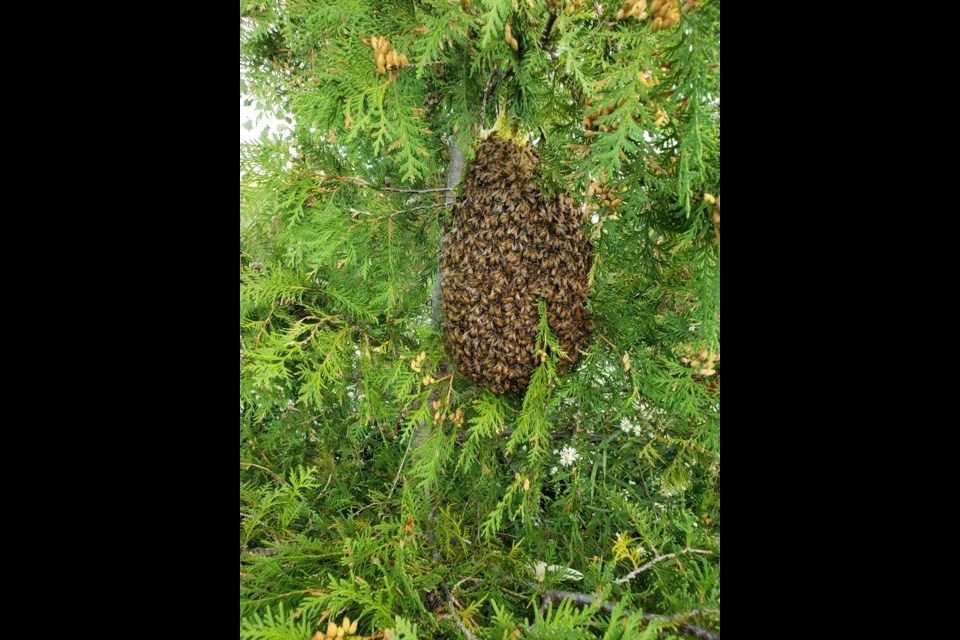Mike Barber developed an interest in beekeeping as a hobby seven years ago in an effort to encourage pollination in his backyard garden and he jokes that it has developed into a habit-forming activity.
“I became more and more addicted to the venom from the stings,” said Barber. “I think the more times you get stung the more bee you become. The hive mind is manipulating you into thinking you need more and more bees.”
He now manages more than 50 hives through his business, Tri-City Bee Rescue, that specializes in rescuing and relocating honeybee swarms as well as the hives of other pollinators
“When people see a honeybee swarm it is usually upward of 10,000 bees swarming all at once with a virgin queen,” he said. “People phone mostly because, in a season, a strong beehive can collect 200 to 300 pounds of honey. If that is inside your wall that is not good for you.”
A swarm typically occurs when a new virgin queen emerges from a hive and leaves taking thousands of bees with her. They swarm until they find a new location to build a hive.
The ideal situation for Barber and Tri-City Bee Rescue is to capture the queen and her swarm before they establish a nest in unwanted place such as an attic, a wall cavity or even a car.
“Most of the time it is new beekeepers who don’t understand exactly what they are doing,” he said. “So, we just collect swarms and we have moved into relocating pollinators in general as well as wasps when we can. We try to protect pollinators in general.”
Barber was born in Toronto and moved to Guelph 15 years ago to work for local master mason Doug Burpee.
“I kind of got out of masonry,” he said. “I do drywall so, I am still in the trades with my own business Mike Barber Drywall.”
He lives on Alice Street with his wife Natalie Helen Schlee, their daughter River, 7 and son Hudson, 4.
“I started beekeeping around the time River was born,” he said. “My friend Andrew started keeping bees in his backyard and I checked the hive back there. We started talking about the decline in bee populations and all this kind of stuff. I put a shout out if anybody knows any beekeepers that would want to keep a couple hives in my back yard let me know.”
He began donating surplus vegetables from his garden to the Two Rivers Neighbourhood Group.
“A big thing for me is food security,” said Barber. “We grew up pretty poor in Toronto so, I am always looking for ways to help the community and I actually founded the Grow Gardens at Grace Community Church. The gardens purpose is to grow food for emergency food coverage for Guelph and the surrounding area.”
Food security has been threatened by the decline in natural pollinators including honeybees and the public’s response to that decline has led to an increase in demand for Barber’s rescue services.
“I started seeing the issues with swarms and it is happening more and more because people want to help bees,” he said. “A lot of people get hives and think, okay, bees will move into my hives and I will just let them do what they do naturally, and they will be okay but the road to hell is paved with good intentions.”
Recently, Barber and his fellow bee rescuer and mentor Ken Muschick were called to the south end of the city where a swarm of honeybees was attempting to nest in a parked car.
“The queen had actually worked her way into the dashboard,” said Barber. “We had to take the dash apart, get the queen out then all the bees left. Obviously, the owner was happy because you can’t drive around with a swarm of bees in your car.”
Barber believes that problems with swarms can be prevented if new beekeepers educate themselves.
“We try to do a bunch of classes because if you let bees do what they do naturally they will swarm,” he said. “That is how they propagate. People are trying to be kind but they are actually putting the bees at risk and putting people at risk.”
They don’t charge to capture a swarm but that changes if they have to remove an established hive from a home or other structure. He and Muschick fund the service by selling honey and bee products as well as hives, bees and queens.
“I don’t think we have made a profit in the last five years, but we have covered our costs,” said Barber. “There are businesses that do it for profit. We’re not one of them. We don’t focus on making money. We focus on the rescue side of it. It’s a business of pleasure more than a business of profit.”